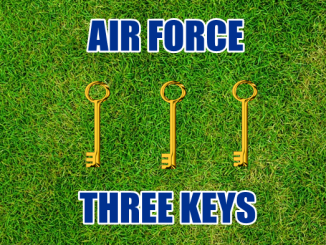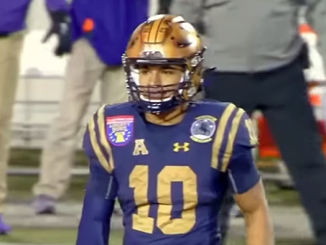
Go back to last December. Go back to the moment when Army played Houston in the Armed Forces Bowl, just before Christmas.
By Matt Zemek
When the Black Knights took the field for that game, they owned 10 wins. They had just won back-to-back Commander In Chief’s Trophies. They had not only taken ownership of the Navy rivalry and the CIC Trophy series, but they had risen to the lofty place Navy had inhabited in 2015, when the Midshipmen also won 10 regular-season games.
Army then proceeded to slap a major beatdown on Houston, scoring at least 14 points in all four quarters and 28 in the second stanza, en route to a 70-14 thrashing.
The 2018 Army team, much like the 2015 Navy team, deserved to play a high-level opponent in a bowl game, but because the bowl system still has so many contractual limitations, that did not happen. Army could only play Houston, so the Black Knights simply had to crush the Cougars as forcefully as possible and let that statement speak for itself.
Army spoke as loudly and as eloquently as possible. The best Army season since 1996 had been completed. Army lost only two games in a season for just the second time since 1967.
All while Army trounced Houston, its other two service-academy competitors weren’t even playing in bowl games.
Air Force missed the postseason at 5-7. Navy fell to 3-9.
Everything you knew – or thought you knew – as a follower of service-academy football over the previous 15 years had been turned upside down.
Throughout the 21st century – more precisely, ever since that luminous 1996 Army season – the Black Knights had been irrelevant in the CIC Trophy race. From 1997 through 2016, a period of 20 straight seasons, the CIC Trophy was a foreign object in West Point. It resided either in Annapolis or Colorado Springs, as Navy and Air Force staged their own battle for service-academy supremacy.
Army’s losing streak against Navy and its CIC Trophy drought made it seem hard to conceive of a world in which West Point could once again rule the roost.
Yet, you saw Jeff Monken transform Army the past few years. You saw how he and defensive coordinator Jay Bateman turned the Black Knights into a disciplined defensive machine which – like past Army teams – played Navy and Air Force close, but THIS time, didn’t make the big mistake. This time, Army held firm while its service-academy opponents either imploded or (on a smaller but still significant scale) blinked under pressure.
Army evolved. Its academy opponents both stagnated and then regressed.
Entering 2019, few people thought Army would win double-digit games for the third straight season, but no one was expecting Army to fall off a cliff.
If anyone had told you in August that entering the final weekend of October, Army would clearly and unambiguously become the worst of the three service-academy programs, you certainly would have been met with puzzled looks, possibly some gentle comments about needing your head to be examined.
Yet, here we are.
There really is zero debate about the matter. Army is third in the CIC Trophy landscape before having played a single CIC Trophy game this season. The Black Knights have to go to Colorado Springs in a few weeks before the Navy game on Dec. 14.
One might have been able to say a few weeks ago that Army was going through a rough patch, and that (reasonably) Tulane is a much-improved team, which meant that Army lost to a superior opponent. That was a fair line of argument. Losing to Tulane is not the black mark today it would have been a few years ago.
However, Army has since lost to Western Kentucky, and now to Georgia State.
A little reminder about GSU: The Panthers lost to Texas State. They fell to Western Michigan by 47 points. Yes, Georgia State beat Tennessee, but we know how bad the Vols are.
Army has no business losing to Georgia State, no business failing to light up the Panthers.
Army can’t score. The Black Knights are the same team which almost won at Michigan. They had a much harder time stopping Georgia State’s offense than Michigan’s. Army was fortunate that Georgia State fumbled at the Army 2. Otherwise, this 28-21 loss could have been even more decisive.
Big plays are not a part of the Army arsenal right now. There is nothing wrong with controlling the ball in general, but not being able to spring home-run plays makes the Black Knights far less dangerous.
It leaves them at a huge deficit relative to Air Force and Navy, as Saturday’s other academy games reinforced.
Navy faced a bad team – a team it should beat – and handled business very easily, smothering South Florida, 35-3. This doesn’t mean Navy is an elite team, but it means Navy is a very good team akin to what we saw through 2016, and for the vast majority of this century. Navy’s no-drama-rama day against USF is the standard Army had attained, but has just as quickly relinquished.
Air Force posted 56 points against a not-that-bad Hawaii team in Aloha Stadium. Air Force scored 21 points in two separate quarters and got the big plays Army has been lacking, including a 97-yard pick-six to cap the scoring. Air Force hit long passes and busted long runs, scoring from every spot on the field.
Army, the king of the academies just a year ago, is now watching its two competitors do the things the Black Knights are no longer able to do.
Army will try to go back to the drawing board against San Jose State, while Navy plays a key AAC West game against Tulane and Air Force plays a big Mountain West Mountain Division game against Utah State.
Tulane just lost to Memphis, giving Navy a chance to move up the standings in the AAC West in pursuit of division-leading SMU.
In the Mountain West, Utah State’s defense looked brilliant in a 36-10 shutdown of Nevada, so Air Force’s offense knows that a vigorous challenge awaits.




Be the first to comment